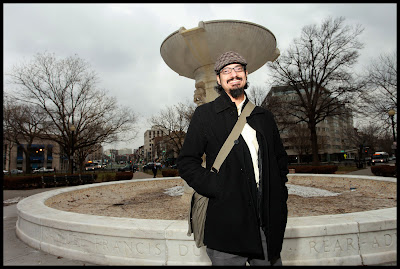“I was born in Utah and then traveled around the country with my folks while my Dad was doing graduate school. I moved to the D.C. metro area when I was 8. I left for college and then ended up back in D.C., but did not plan on staying here. Bikini Kill, a band that I was really into, did a benefit concert for Helping Individual Prostitutes Survive (HIPS). Throughout my life, I had really close friends who chose to do informal sex work because working the graveyard shift at 7-11 sucks. In doing that, many of them got into abusive situations and did not have the resources to get help. HIPS seemed like the right place for me to volunteer at the right time. I started as a volunteer in 1994 and have been here in different capacities every since. I became the executive director in 2001.
"At HIPS, we are working to improve the health and welfare of sex workers rather than trying to 'save them' from what they were doing. We work using a harm reduction strategy. At HIPS, we work with sex workers to help them decide what is and is not working in their lives. It’s all about self determination. There are few people who we interact with who are doing sex work in whatever capacity for a new purse or a $600 pair of shoes. Most of the people we work with are trying to feed themselves and their families or pay the rent. Some have chosen to do this over other forms of employment. More often than not, they are doing this because it is a last resort. Some are also supporting drug habits and some have not had access to education or job counseling. It is very hard to live in this city on minimum wage. The myth about upward mobility in employment does not play out all that well. As much as we work with job training, it is challenging for many of these people to find regular employment.
"The more we push sex work underground, the more dangerous it gets. Since the institution of the prostitution free zones in D.C., which are similar to drug free zones, and gentrification, sex workers are working increasingly in poorer, more dangerous neighborhoods. Now, we are also seeing how technology is changing sex work. When I started at HIPS, it wasn’t really safe to stroll without working for an established pimp or manager. In some ways, technology gives sex workers more ability to work independently if you have the access and knowledge. Yet, in some sense, it has made sex work less visible and more underground. Now, you don’t have that person on the corner who is going to make sure you get back from your date alright. We do outreach to both those on the corners and online to help them stay safe and informed.
"We have varied interactions with the powers that be in Washington. We are funded publicly by the health department for HIV prevention, needle exchange and victims services. Thanks to their support, we are able to make sure that our clients, sex workers, have the tools they need to reduce the public health problems normally associated with this work. Obviously, our goal is different than law enforcement and sometimes, we can be at odds. Our goal is to help empower sex workers. The only real tool that the police has is mass incarceration, which is a success story to them, but in our view is not a success story in the long run.
"Our approach is that we want to live in a healthy community that is free of violence, coercion, and disease. Unfortunately, those in sex work get the brunt of those things. By working with that population to address their health and wellness, we are raising the bar for this city. Because we make those conditions less miserable, sometimes sex workers have the ability to do something different. We find that the less coerced and dependent people feel, the more they are able to make informed decision about sex work. The more we can improve their lives, the more they will settle on a job that they like that gives them agency."
Cyndee Clay is the executive director of HIPS.













